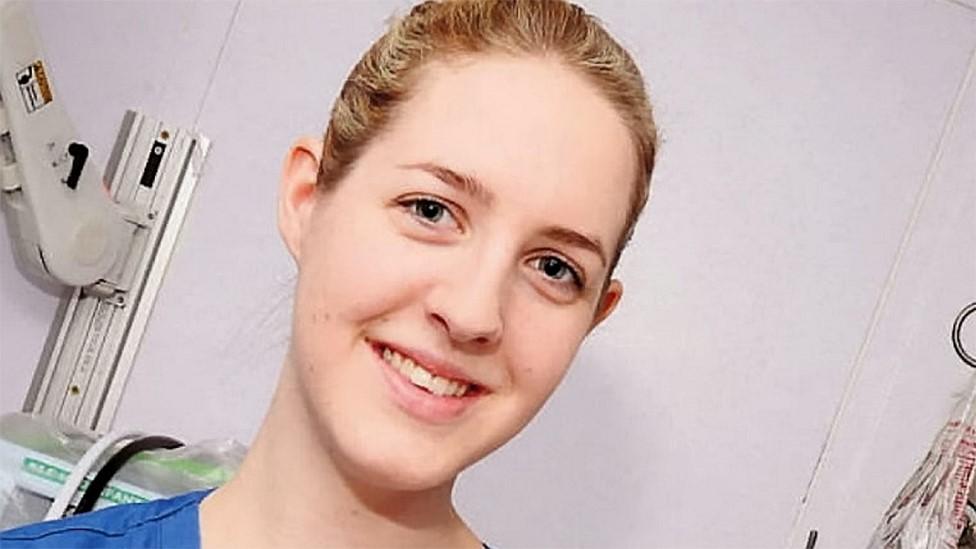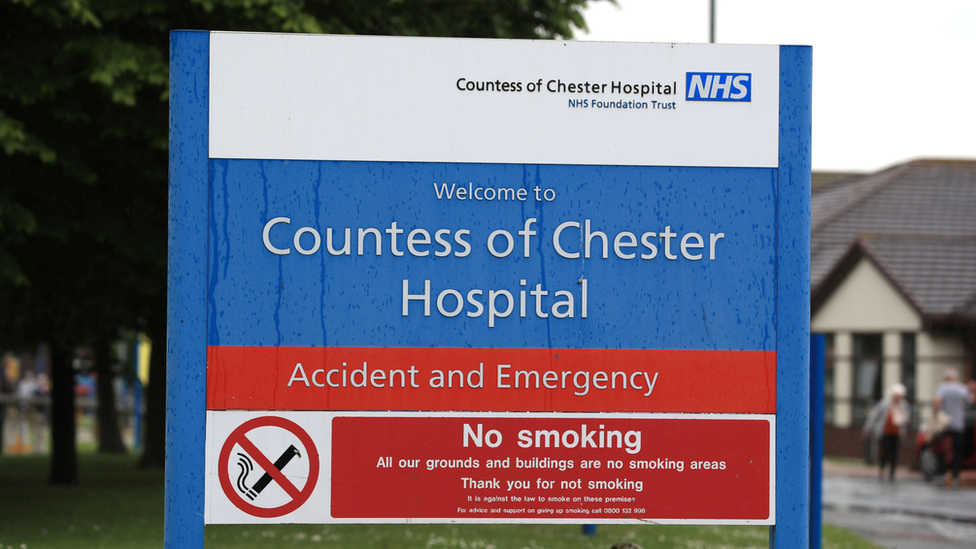Lucy Letby: Unusual amount of gas in baby, trial hears
- Published

Lucy Letby is accused of murdering and attempting to murder babies on a neo-natal ward
An "unusual" amount of gas was detected in a baby triplet just hours after his brother was allegedly murdered by nurse Lucy Letby, her trial has heard.
Ms Letby is alleged to have administered fatal doses of air to both infants at Countess of Chester Hospital on successive days in 2016.
Child O died two days after he and his identical triplet brothers were born in good condition, the jury has heard.
Ms Letby denies murdering seven babies and attempting to murder 10 others.
Manchester Crown Court heard how, following the death of Child O at 17:47 BST, his brother Child P was reviewed on the neo-natal unit by a consultant who ordered an abdominal X-ray.
The X-ray, timed at 20:07, noted "gas filled loops throughout the abdomen", the jury heard.
Ms Letby, 33, was the designated nurse for Child O and P on the day shift and continued to care for Child P the following day.
Child P collapsed on various occasions from 09:35 onwards and required resuscitation after his heart rate and blood oxygen levels plummeted.
Medics, including Ms Letby, were unable to revive the youngster from his final collapse at about 15:15 and he was pronounced dead at 16:00.
An ambulance team had arrived at the Countess of Chester at 15:00 in preparation for transferring Child P to a specialist hospital.
When he died, his parents "begged" the team doctor to take their surviving triplet instead, which he agreed to.

The nurse is accused of carrying out the attack at Countess of Chester Hospital
Giving evidence, Dr Owen Arthurs, professor of radiology at London's Great Ormond Street Hospital, said the X-ray of Child P was "very similar in appearance" to one taken of Child O.
He told the court: "This is gas throughout the gut. This degree of gas is quite unusual in a baby like this."
He said potential causes were infection or necrotising enterocolitis (NEC), a common bowel disorder in premature-born babies.
An alternative explanation was the administration of air via a nasogastric tube, he said.
Dr Arthurs came to the same conclusions regarding an X-ray of Child O, captured hours before his death.
He said: "This shows a lots of gas in his stomach, small and large bowel. This is more than what would be expected in a normal baby."
Dr Arthurs agreed with Ben Myers KC, defending, that another possible explanation for Child P's dilation was an "unidentifiable cause".
On the day after Child O's death, Ms Letby was assigned the day shift care of the surviving triplet as well as Child P, the court heard.
Ahead of the shift a doctor, who cannot be identified for legal reasons, messaged Ms Letby: "Are you OK? It's rubbish not to sleep well in the middle of 3 long days. Hope your day goes OK."
Ms Letby replied: "Hmm maybe. I'll be watching them both [Child P and the surviving triplet] like a hawk.
"I'm OK. Just don't want to be here really. Hoping I may get the new admissions."
Ms Letby, originally from Hereford, denies a total of 22 allegation dating between June 2015 and June 2016.
The trial continues.

Why not follow BBC North West on Facebook, external, Twitter, external and Instagram, external? You can also send story ideas to northwest.newsonline@bbc.co.uk, external
Related topics
- Published15 March 2023

- Published14 March 2023

- Published8 March 2023

- Published7 March 2023

- Published6 March 2023

- Published3 March 2023

- Published2 March 2023

- Published1 March 2023

- Published28 February 2023
